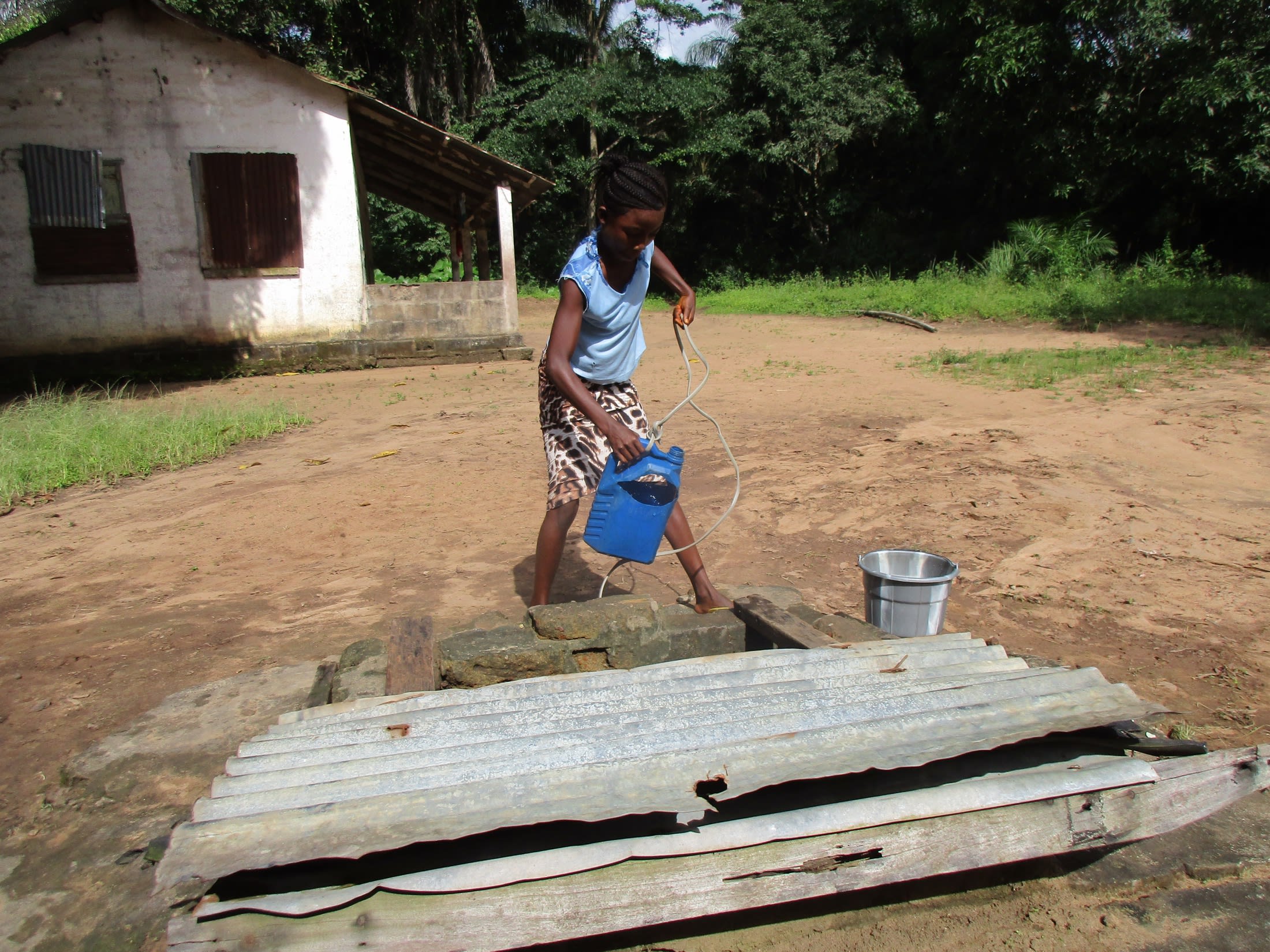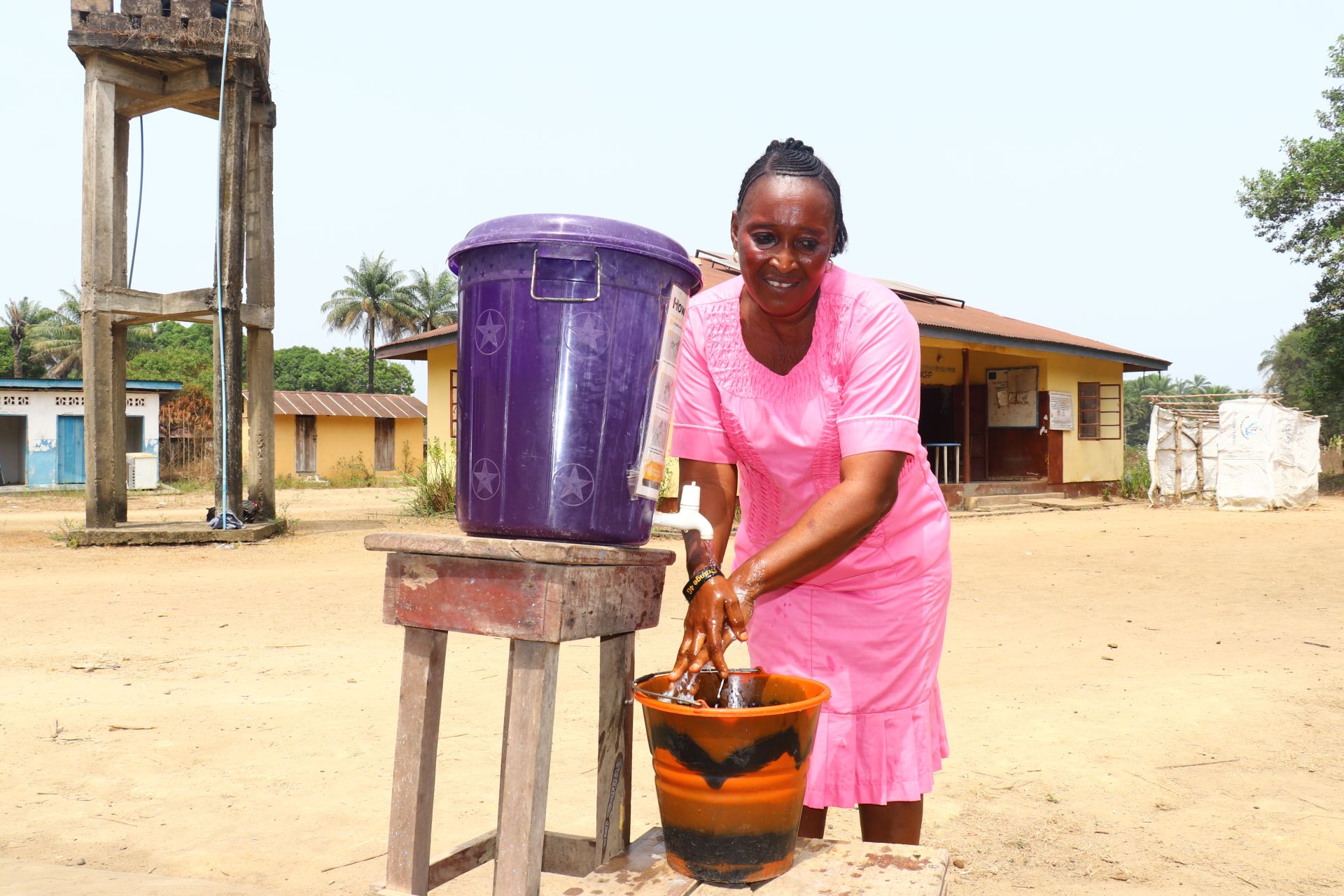There are 216 people who live near the Katongha Maternal Child Health Post. However, the health center also provides services for 16 different villages that have a population of over 3000 people. Yet, the staff nurses face the uncertainty of whether they will have enough water to meet their patients' needs daily. Understandably, the nature of their work means they need water to treat patients and provide adequate, safe medical care. Still, the nurses also live on the premises, requiring water for their drinking, cooking, bathing, and laundry.
"The health facility is unique because it caters [to] all categories of people: children, pregnant women, lactating mothers, and older people. Looking at the number of nurses (2) at the clinic, I was impressed with the number of cases the nurses deal with [in] a day. The nurses see over twenty patients for a day," said field officer Julius Sesay.

The nurses and their patients are not the only ones suffering without sufficient water. The surrounding community members living near the health center and a local primary school also rely on the health center well for the water they need, but it is impossible for it to serve everyone in its current condition.
"The people in this community are faced with a lot of challenges when it comes to the fetching of water. Their main water source, which is at the health facility, is overcrowded with people. Community members will spend a lot of time at the water point trying to fetch water," said Julius.

The clinic's dug well with a hand pump (shown above) needs rehabilitation because it can not keep up with demand. The constant overuse means it experiences frequent breakdowns, and during the dry season, the water diminishes quickly, leaving everyone scrambling to find water elsewhere.
The only alternative is an open well at the extreme other end of the community, but when left without options, people have no choice but to use the water, wasting valuable time and risking their health.

"There [is a] series of health consequences facing the water users in the community. Some of them have suffered from typhoid, diarrhea, dysentery, and even gastroenteritis and skin rashes simply because [of] the water they [used to] drink and bathe," Julius said.
"Running a health facility without water [is] difficult. Water is needed to cook, launder, drink, and use the toilet. [Patients] use a lot of water to take their drugs, wash their hands, and use the latrines," said 34-year-old nurse Isatu Bangura, shown below carrying water from the alternative well.

"The underlying cause for the suffering for water is the frequent pump breakdown of our main water source. During such [a] situation, even fetching drinking water would be difficult. I spend most of my time fetching water from our alternate source. It's time-consuming to fetch and transport water to the clinic. This makes me have divided attention since I would be fetching water and, at the same time, trying to attend to patients," continued Isatu.
"I will be very happy if our main water source becomes functional again. Rehabilitating our main water source will prevent us from all [the] unnecessary constraints we are now facing," concluded Isatu.
"Ever since the well [went] dry, I have been faced with a lot of challenges when it comes to the fetching of water. I must go down to the open well to fetch water. The distance and the waiting time at the water point delay me, especially in the morning hours when a lot of people will be at the water point to fetch water. The other challenge I face is that one is expected to bend down and draw water from the well using a rope. This is difficult, especially when I [have] a lot of containers to fill. By the time I fetch and transport the water home, I will not be able to go to school on time. Even to complete some of the work at home will be hard," shared 15-year-old student Isatu Kamara, shown below, collecting water from the alternative well.

The rehabilitation of the clinic well will enable staff and patients to have water to meet their daily needs and relieve some of the surrounding community's water crisis. With sufficient water, hopefully, everyone will be able to focus on completing their essential daily tasks. Ideally, this will improve the community's overall health and allow people to make progress.
Note: Our proposed water point can only serve 300 people per day. We have identified another project at Katongha Primary School that should help ensure all of the people in this community have access to safe and reliable drinking water.
The Proposed Solution, Determined Together...
At The Water Project, everyone has a part in conversations and solutions. We operate in transparency, believing it benefits everyone. We expect reliability from one another as well as our water solutions. Everyone involved makes this possible through hard work and dedication.
In a joint discovery process, community members determine their most advantageous water solution alongside our technical experts. Read more specifics about this solution on the What We're Building tab of this project page. Then, community members lend their support by collecting needed construction materials (sometimes for months ahead of time!), providing labor alongside our artisans, sheltering and feeding the builders, and supplying additional resources.
Water Access for Everyone
This water project is one piece in a large puzzle. In Kenya, Sierra Leone, and Uganda, we're working toward complete coverage of reliable, maintained water sources that guarantee public access now and in the future within a 30-minute round trip for each community, household, school, and health center. One day, we hope to report that this has been achieved!
Training on Health, Hygiene & More
With the community's input, we've identified topics where training will increase positive health outcomes at personal, household, and community levels. We'll coordinate with them to find the best training date. Some examples of what we train communities on are:
- Improved hygiene, health, and sanitation habits
- Safe water handling, storage & treatment
- Disease prevention and proper handwashing
- Income-generation
- Community leadership, governance, & election of a water committee
- Operation and maintenance of the water point




 Borehole Well and Hand Pump
Borehole Well and Hand Pump



























